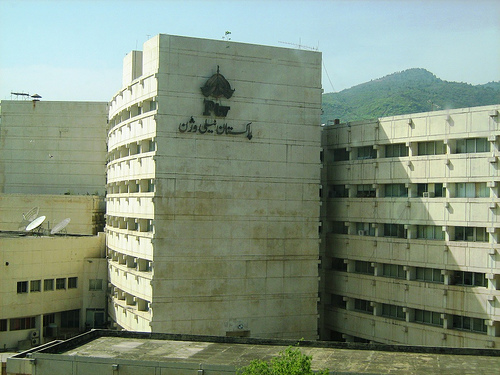The government has decided to abolish 1,232 positions, nearly one in four sanctioned posts, at Pakistan Television Corporation (PTV) to reduce its financial losses.
The announcement was made during Friday’s Cabinet Committee on State-Owned Enterprises (CCoSOEs) meeting, which Finance Minister Muhammad Aurangzeb chaired.
“The Committee was told that out of 5,442 sanctioned posts of PTV, 1,232 posts had also been abolished to save costs,” a press release by the Ministry of Finance stated. PTV currently employs 95 anchorpersons, highlighting concerns about overstaffing in the organization.
In addition to downsizing, the committee approved new business plans for both PTV and the Pakistan Broadcasting Corporation (PBC). The Ministry of Information presented a revival strategy for PTV, emphasizing digital expansion, content licensing, profitable marketing partnerships, and public-private collaborations.
“We need to proactively use unutilized assets, focusing on private-sector sales rather than real estate ventures, so PTV and PBC can focus on their primary role as state broadcasters,” the committee recommended. The revival plans also outlined steps to increase revenues, secure sponsorships, and cut operational costs.
Details revealed that PTV News underperformed in FY2023-24, earning Rs200 million against a budgeted income of Rs357 million. Its expenses, however, rose to Rs688 million, exceeding the budgeted Rs585 million. The government aims to address these financial challenges through the proposed measures.
PBC’s business plan targets financial sustainability by improving program content and signal quality. The broadcaster plans to utilize unoccupied spaces, including seven large unutilized properties and six open land parcels, for income generation. “Installing ATM booths and advertising billboards at Radio Pakistan’s locations are part of the revenue strategy,” the finance ministry noted.
PBC anticipates achieving financial break-even within two years if the proposed measures are implemented effectively. Both plans face hurdles identified in a PESTLE analysis, with government oversight often influencing content and limiting advertising revenue compared to private channels.
Despite these challenges, there is significant potential for growth. Pakistan’s TV advertising expenditure rose to Rs50 billion in FY2023-24 from Rs43.4 billion the previous year. In contrast, digital advertising spending declined slightly to Rs25.25 billion, highlighting shifting market dynamics.
In addition to broadcaster reforms, the CCoSOEs approved reconstitutions for two key boards. The Board of Directors for the Karachi Tools, Dies, and Mould Centre (KTDMC) was restructured, with Abdur Razaaq Gauhar appointed as Chairman.
Similarly, the Technology Up-gradation and Skills Development Company (TUSDEC) board was reconstituted, naming Muhammad Noorud Din Daud as Chairman.
“These changes align with the SOEs Ownership and Management Policy, 2023, to improve corporate governance and operational efficiency,” the finance ministry added. The government’s actions signal a focused effort to address inefficiencies in state-owned enterprises, paving the way for long-term sustainability and profitability.























